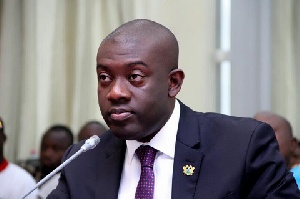- Home - News
- TWI News | TV
- Polls
- Year In Review
- News Archive
- Crime & Punishment
- Politics
- Regional
- Editorial
- Health
- Ghanaians Abroad
- Tabloid
- Africa
- Religion
- Election 2020
- Coronavirus
- News Videos | TV
- Photo Archives
- News Headlines
- Press Release
General News of Sunday, 18 June 2017
Source: kasapafmonline.com
Towing fee brouhaha: Government begins review
Government has began engaging stakeholders in a bid to review compulsory towing fees scheduled to be effective from next month.
Effective July 1, 2017, vehicle owners and motorcyclists will pay compulsory annual fees, tied to the acquisition of a road worthy certificate, to cater for towing services.
Fees per year for both commercial and non-commercial vehicles, depending on tonnage, range from ?20 to ? 200.
A section of the public especially drivers have vowed to resist the implementation of the towing fees arguing that it is unfair.
Renowned Road Transport Consultant, Cecil Garbrah on Wednesday, described the decision as “rubbish” arguing, there was not enough awareness creation on the regulation, while Policy Analyst Dr Wereko Brobbey has called on President Akufo Addo to immediately halt the implementation of the policy.
An activist of the governing New New Patriotic Party (NPP) Hopeson Adorye has vowed to organize a massive demonstration against government if it should go ahead and implement the collection of mandatory towing fees.
He believes the policy if made effective will amount to plain theivery as the move cannot be justified by any right thinking member of the public. However speaking on Joy FM’s News File show Saturday, Deputy Information Minister, Kojo Oppong Nkrumah said steps are being taken to review the decision.
“Ask around the table how many people heard about it, how many people in civil society, members of Parliament, various persons under these interested groups who are affected by it. For me the important thing is this, it is good that this thing has come to the limelight. I can tell you the view of government, government has taken notice of this.
I do know that as late as last night (Friday) there were series of engagements from stakeholders picking the various pieces of legislation that have to deal with this one, the LI 2180, the last fees and chrages schedule and calling various meeting with the stakeholders to take a second look at this thing whether or not there’s room to do the necessary maneuvers that will ensure that the problem is solved but solved in a manner that will be generally acceptable to the broader population.
But for me it raises a fundamental issue that when matters of this nature come up we need to broaden the scope of engagement on it.”











